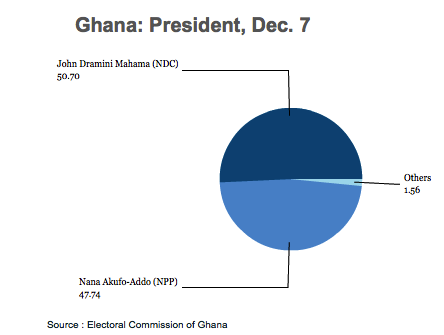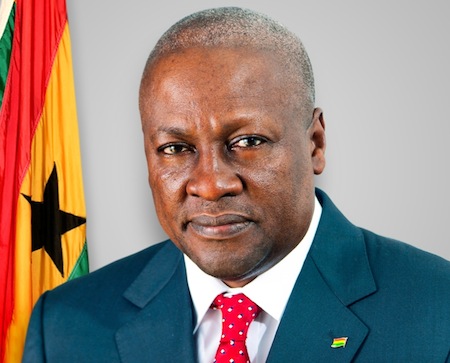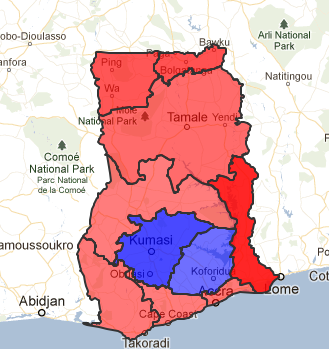Despite howls of protest about fraud from the opposition, John Dramani Mahama (pictured above) has won reelection as Ghana’s president in what appears to be an impressive victory for the National Democratic Congress (NDC).
Although Mahama ascended to the presidency only in July upon the untimely death of John Atta Mills, his election victory against Nana Akufo-Addo of the New Patriotic Party (NPP) exceeded Mills’s own victory against Akufo-Addo in 2008.
Mahama won 50.70%, giving him a margin of victory sufficient for a first-round victory and avoiding a potential runoff on December 28, unlike in 2008, when Mills defeated Akufo-Addo in an incredibly tight contest (and after Akufo-Addo actually won the first round).

Paa Kwesi Nduom of the Progressive People’s Party (PPP), who also ran in 2008, finished with 0.59% of the vote, much less than his 2008 total.
Akufo-Addo has not yet conceded defeat, however, and the NPP is considering legal action to annul the election result. In particular, the NPP is charging that Mahama’s government manipulated the results of two constituencies, one in the north and another in Accra, Ghana’s capital, to deliver 25,000 extra votes to Mahama, and it has called for an audit of the ballots counted in the presidential election. Although Mahama’s margin of victory was around 326,000 votes, balloting was extended from Friday into Saturday in some regions because of voting glitches. So while it seems doubtful that Akufo-Addo will prevail, electoral irregularities are not necessarily outside the realm of possibility, and NPP supporters demonstrated outside Ghana’s electoral commission over the weekend in protest.
Akufo-Addo’s familiarity to voters and his status as a veteran politician made him an incredibly effective challenger, especially because of his seductive platform for improvements to Ghana’s primary education system and a promise for universal secondary education and health care for all Ghanaian children. Ultimately, however, Mahama inherited a government from Mills that grew last year at a staggering rate of 14.4% — Ghana’s economy was already doing very well when oil was discovered in 2007 (and first extracted in 2010), and it would have been quite a feat for Akufo-Addo to have defeated an incumbent in a country that marked Africa’s highest growth rate last year.
The NDC, under longtime president Jerry Rawlings, stabilized Ghana’s once-disasterous economy in the 1980s and 1990s and set the stage for Ghana’s transformation into a democracy.
The weekend’s election marked the fourth consecutive free and fair election since Rawlings peacefully transferred power after the 2000 election to the NPP’s John Kufuor.
What’s more striking than the total vote, however, is the regional result (set forth below in an election map– red for Mahama, blue for Akufo-Addo). Unlike in 2008, when Akufo-Addo won essentially all of the south of Ghana (except for the greater Accra region in the southeast and the Volta region that runs in a narrow strip along Ghana’s eastern border), Mahama made inroads in what’s been traditionally NPP territory. It’s worth noting, however, that in the dense Ashanti region (the deep blue region on the map), the heartland of the Akan ethnic group (Ghana’s largest), Akufo-Addo won 71.2% of the vote to just 28.0% of the vote for Mahama, and in the Eastern Region (the only other blue region), Akufo-Addo won 56.3% to 42.6% for Mahama. Within the greater Accra region, Mahama won a steady 53% of the vote to 46.2% for Akufo-Addo.
We don’t have the full results of the parliamentary elections, which were held simultaneously with the presidential election, but the current count shows the NDC with 84 seats and the NPP with 79 seats. Ghana’s unicameral parliament currently has 230 seats and is controlled (narrowly) by Mahama’s NDC, but Friday’s election featured an expanded parliament with 275 seats. Given the closeness of the election and the flexibility of 45 new parliamentary seats, there’s still a chance that the NPP could control the parliament, despite Mahama’s presidential win, an outcome that would be unique in Ghana’s political history.

